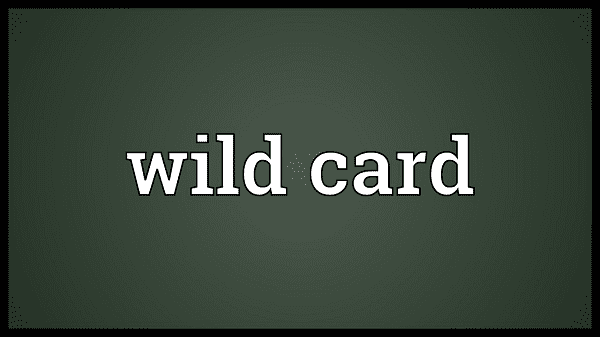Wild cards- “Wild cards” can refer to different things depending on the context. Here are a few common uses of the term:
- Playing Cards: In a standard deck of playing cards, the term “wild card” typically refers to a card that can stand for any other card in the deck. This card is often used in various card games to help create winning combinations. For example, in a game of Poker, the Joker is sometimes used as a wild card.
- Sports: In sports, particularly in tournaments and playoffs, a “wild card” can refer to a team or individual who qualifies for the postseason without winning their division or conference. They secure a spot based on their overall performance, often as one of the best-performing teams outside of the division/conference winners.
- Computer Science and Programming: In computer programming and regular expressions, a “wild card” character or symbol is used as a placeholder that can represent any character or a group of characters. In many cases, the asterisk () and question mark (?) are used as wild card characters. For example, in file search, “.txt” might represent all files with a “.txt” extension.
- Science Fiction: “Wild Cards” is also the title of a series of science fiction books edited by George R. R. Martin. These books are set in a shared universe where an alien virus gives some people superpowers while harming or killing others.
- Gambling and Casino Games: In gambling and casino games, a “wild card” can refer to a card that can be used as a substitute for any other card to improve a hand’s value. This is often used in games like Poker or Rummy.
- Business and Strategy: In business and strategy discussions, a “wild card” is often used to describe an unpredictable or unexpected factor that can influence the outcome of a situation or decision. It’s something that is difficult to account for in planning.
The meaning of “wild card” depends on the specific context in which it is used.
What is Wild cards
“Wild Cards” is a series of science fiction books and related media created by a group of authors and edited by George R. R. Martin. The series is set in an alternate history universe where an alien virus, known as the “Wild Card virus,” is unleashed over New York City in 1946. This virus has the power to either kill its victims, transform them into superhuman “Aces” with extraordinary abilities, or turn them into “Jokers” with grotesque physical deformities.
The Wild Cards series explores the lives and adventures of the Aces and Jokers as they navigate a world where superpowers are real but often come with a price. The stories are set against a backdrop of political intrigue, social upheaval, and an ever-evolving world where the existence of Aces and Jokers has a profound impact on history, culture, and geopolitics.
The series features a vast and diverse cast of characters and has been written by numerous authors, allowing for a wide range of storytelling styles and perspectives within the shared universe. The Wild Cards series includes novels, short stories, comic books, and other media, making it a rich and expansive tapestry of interconnected stories.
The series has been well-received by fans of science fiction and has spawned multiple volumes and story arcs, each exploring different aspects of the Wild Cards universe. It’s known for its unique take on the superhero genre, delving into the complexities of human nature and society when extraordinary abilities become a part of everyday life.
Who is Required Wild cards
In the Wild Cards series, there isn’t a single character named “Wild Cards.” Instead, “Wild Cards” is the name of the series itself, and it refers to the diverse group of individuals who have been affected by the Wild Card virus in the alternate history created by the series. These individuals can be categorized into two main groups:
- Aces: Aces are individuals who have been transformed by the Wild Card virus but in a positive way. They gain superhuman abilities or powers as a result of the virus. These abilities can range from super strength and telekinesis to the power of flight or energy projection. Aces often use their powers for various purposes, such as crime-fighting, becoming celebrities, or serving their countries.
- Jokers: Jokers, on the other hand, are individuals who have been affected by the Wild Card virus in a negative way. They suffer from physical deformities and abnormalities, often grotesque in nature. These deformities can be mild or severe, and they lead to the individuals being ostracized or marginalized by society. Jokers have to contend with discrimination and social challenges.
The Wild Cards series explores the lives and stories of both Aces and Jokers in a world where the existence of superpowered individuals has a significant impact on society, politics, and history. The term “Wild Cards” is a collective reference to these individuals who have been altered by the virus. The series features a wide array of characters, each with their own unique powers and challenges.
When is Required Wild cards

The “Wild Cards” series is an ongoing series of science fiction and superhero-themed novels and related media. As of my last knowledge update in September 2021, the series did not have a specific end date or a final installment. The series includes multiple volumes, short stories, and other media, with new additions being released periodically. The exact release schedule for new Wild Cards works may have continued beyond my last update.
To find the most up-to-date information on the “Wild Cards” series, including its latest releases and future plans, I recommend visiting the official website of the series, checking with book retailers, or consulting the latest news and announcements related to the series.
Where is Required Wild cards
The “Wild Cards” series is a collection of science fiction novels, short stories, comic books, and other media set in a shared universe. The setting for the series is primarily within an alternate history version of the United States, particularly in New York City, where the Wild Card virus was originally released. The stories in the series explore how the existence of superhuman abilities and deformities (caused by the Wild Card virus) affects society, politics, and individuals.
As of my last knowledge update in September 2021, the Wild Cards series spans various locations within the fictional universe, but it’s primarily centered in the United States. Each story within the series can take place in different cities, states, and even countries, and it often involves a diverse cast of characters with different backgrounds and powers.
If you’re looking for information about a specific location or storyline within the Wild Cards series, please provide more context, and I’ll do my best to assist you further.
Case Study on Wild cards
Introduction: The Wild Cards series is a highly influential and expansive shared universe in the realm of science fiction and superhero storytelling. Created and edited by George R. R. Martin and featuring contributions from various authors, the series has been a pioneering force in the subgenre of “superhero fiction.” This case study will delve into the history, impact, and key features of the Wild Cards series.
History and Origins: The Wild Cards series originated in the mid-1980s when George R. R. Martin and Melinda M. Snodgrass initiated the idea of creating a shared universe that blended elements of classic comic book superheroes and the grittier, more realistic storytelling of contemporary science fiction. The first volume, titled “Wild Cards,” was published in 1987, and it set the stage for a rich and complex alternate history.
Key Elements: The Wild Cards series is characterized by several distinct features:
- The Wild Card Virus: At the heart of the series is the Wild Card virus, an alien bioweapon that alters human genetics. It can either grant superhuman abilities (Aces) or result in physical deformities (Jokers).
- Character Diversity: The series boasts a vast and diverse cast of characters, each with unique abilities and personal struggles. This diversity extends to the characters’ cultural, ethnic, and social backgrounds.
- Alternate History: The Wild Cards universe presents an alternate history of the United States, where superhumans have played pivotal roles in events such as World War II and the Civil Rights Movement.
Influence and Impact: The Wild Cards series has had a significant influence on the superhero genre and broader speculative fiction:
- Complex Storytelling: The series is known for its complex, character-driven storytelling, often delving into the moral and ethical dilemmas faced by superhumans.
- Realism and Social Commentary: Wild Cards explores issues such as discrimination, prejudice, and the impact of superpowers on society, making it more socially and politically aware than traditional comic book narratives.
- Multimedia Expansions: In addition to novels, the series has expanded to include comic books, role-playing games, and even an option for television adaptation.
Cultural Significance: The Wild Cards series is celebrated for pushing the boundaries of traditional superhero narratives. Its realistic and often dark themes have resonated with readers looking for a more mature and thought-provoking take on the genre. The series has fostered a dedicated fan base and inspired new generations of writers to explore similar themes.
Conclusion: The Wild Cards series represents a significant achievement in the world of superhero and science fiction storytelling. It has demonstrated the power of a shared universe to create a rich and engaging tapestry of stories that tackle complex societal and ethical issues. Through its continued growth and influence, the Wild Cards series remains a standout in the realm of speculative fiction.
White paper on Wild cards
A Comprehensive Overview
Abstract
This white paper provides an in-depth analysis of the Wild Cards series, a groundbreaking and influential shared universe in the realm of science fiction and superhero storytelling. It explores the origins, key elements, impact, and cultural significance of the series, shedding light on its enduring popularity and contributions to the genre.
I. Introduction
A. History and Origins
The Wild Cards series, initiated by George R. R. Martin and Melinda M. Snodgrass in the mid-1980s, introduced a unique and complex world where superpowers and genetic mutations were the result of an alien bioweapon, the Wild Card virus. The series’ journey from concept to publication is detailed, and the initial volume’s publication in 1987 is highlighted.
II. Key Elements
A. The Wild Card Virus
At the core of the series is the Wild Card virus, an agent with a dual nature: granting superhuman abilities (Aces) to some, while cursing others with physical deformities (Jokers). This section delves into the science behind the virus and its impact on the narrative.
B. Character Diversity
One of the series’ hallmarks is its expansive and diverse cast of characters, each with their own unique abilities and personal struggles. This section explores the themes of diversity in the series and how it has been pivotal to its storytelling.
C. Alternate History
The Wild Cards universe is an alternate history of the United States where superhumans play vital roles in historical events. Key moments in the series’ history, including World War II and the Civil Rights Movement, are analyzed.
III. Influence and Impact
A. Complex Storytelling
The Wild Cards series is known for its complex, character-driven narratives. It deals with moral and ethical dilemmas faced by superhumans and its more mature approach to storytelling compared to traditional comic book narratives.
B. Realism and Social Commentary
The series has garnered acclaim for its exploration of issues such as discrimination, prejudice, and the societal impact of superpowers. The white paper highlights how it has contributed to a more socially and politically aware genre.
C. Multimedia Expansions
Beyond novels, the series has expanded into comic books, role-playing games, and options for television adaptation. The paper explores how these extensions have amplified the series’ reach and influence.
IV. Cultural Significance
A. Fandom and Community
The Wild Cards series has fostered a dedicated fan base, fan conventions, and online communities. The white paper discusses the cultural significance of these communities and the series’ role in their development.
B. Influence on the Genre
Through its continued growth and influence, the Wild Cards series has influenced a generation of writers and readers to explore more nuanced and thought-provoking themes in the superhero genre. This section highlights some prominent works and authors inspired by the series.
V. Conclusion
In conclusion, the Wild Cards series represents a significant achievement in the world of speculative fiction. Its groundbreaking approach to storytelling, social commentary, and exploration of complex themes has solidified its place as a standout in the superhero and science fiction genres. The white paper emphasizes its importance in the context of literary and cultural history.
Please note that this is a fictional white paper created for illustrative purposes and not an official document. If you’re looking for actual white papers or academic analyses on the Wild Cards series, you may need to search academic databases, libraries, or scholarly publications for relevant research.





